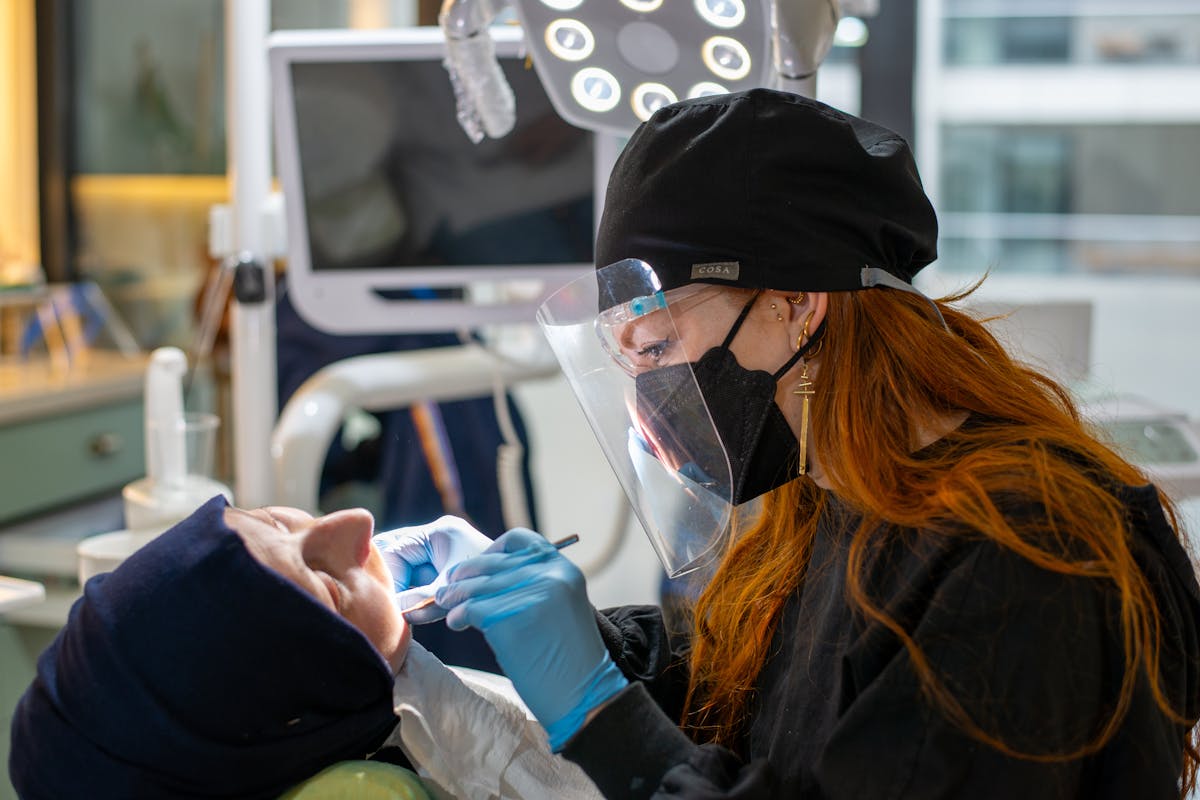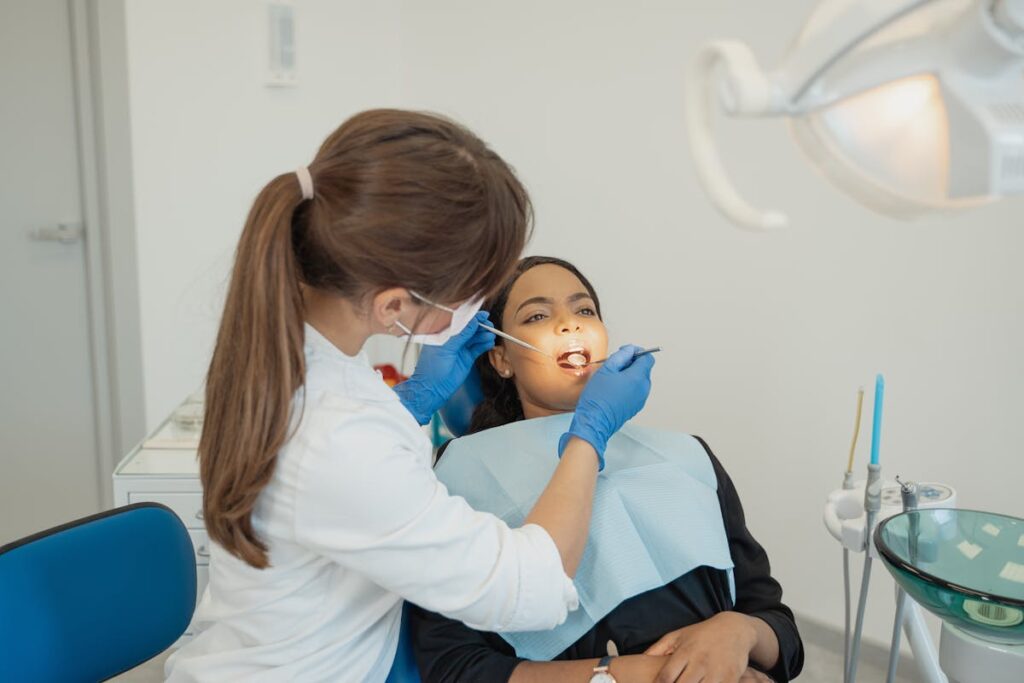Regular dental checkups serve as a cornerstone of preventive oral healthcare. A trusted Archer Ave dentist provides essential screenings, professional cleanings, and expert guidance that contribute to long-term dental wellness. While many individuals postpone these visits due to busy schedules or anxiety, the consequences of delayed care often lead to more complex issues and higher expenses. Understanding the inclusive benefits of routine dental appointments reveals why prevention remains superior to emergency intervention.
Early Detection of Oral Health Issues
Regular dental examinations at Archer Ave enable dentists to identify potential oral health problems in their earliest stages. Through extensive screening protocols and advanced diagnostic tools, practitioners can detect emerging issues before they develop into serious conditions requiring extensive intervention.
Early cavity identification represents a vital component of these preventive examinations. Using digital radiography and visual assessment techniques, dentists can spot demineralization and enamel weakening that precede cavity formation. This early detection facilitates immediate preventive treatment planning, often involving minimally invasive procedures such as fluoride applications or dental sealants.
The examinations also reveal signs of periodontal disease, oral cancer, and structural problems with existing dental work. By addressing these concerns during their initial phases, patients benefit from simpler treatments, reduced costs, and better long-term oral health outcomes.
Professional Teeth Cleaning Benefits
Regular professional teeth cleaning effectively removes plaque and tartar buildup that cannot be eliminated through routine home care alone. The thorough cleaning process includes specialized techniques for preventing gum disease, such as scaling below the gum line and root planing to eliminate bacterial colonies. During the cleaning appointment, dental professionals provide customized oral hygiene recommendations based on each patient’s specific needs and oral health conditions.
Plaque and Tartar Removal
Professional teeth cleaning serves as an essential defense against the accumulation of plaque and tartar, substances that ordinary brushing and flossing cannot fully eliminate. During a professional cleaning session, dental hygienists employ specialized tools and techniques to perform thorough plaque removal from all tooth surfaces, including hard-to-reach areas between teeth and along the gumline.
Complete tartar elimination requires professional intervention, as these calcified deposits bond firmly to tooth enamel. The hygienist uses ultrasonic scalers and hand instruments to carefully dislodge these stubborn deposits without damaging the tooth structure. This process not only enhances oral aesthetics but also prevents periodontal disease, tooth decay, and potential bone loss. Regular professional cleanings, typically recommended every six months, help maintain favorable oral health and prevent the reformation of these harmful deposits.
Gum Disease Prevention Methods
The prevention of gum disease directly correlates with consistent professional teeth cleaning appointments. During these visits, dental professionals assess gingival health and implement targeted preventive measures to combat periodontal disease. Regular cleanings remove bacterial buildup that home care alone cannot effectively address.
Dental hygienists provide individualized instruction on proper brushing techniques, ensuring patients understand the correct pressure, angle, and duration required for ideal oral hygiene. Additionally, they demonstrate interdental cleaning methods, including proper flossing techniques and the use of interdental brushes. These professional interventions, combined with patient education, considerably reduce the risk of gingivitis and periodontitis.
Early detection through regular screenings allows for immediate intervention when signs of gum disease emerge, preventing the progression to more severe periodontal conditions that could lead to tooth loss.
Personalized Oral Care Tips
Each patient’s unique oral health needs require customized care plans developed during professional teeth cleaning appointments. Dental hygienists assess individual mouth structures, bite patterns, and existing conditions to establish personalized brushing habits that address specific problem areas. These recommendations may include modified brush angles, pressure adjustments, or specialized tools for hard-to-reach spaces.
Customized flossing techniques form another essential component of individualized care, with hygienists demonstrating proper methods based on tooth spacing and gum sensitivity. Patients with bridges, implants, or orthodontic appliances receive tailored instructions for maintaining these structures. The hygienist also determines appropriate cleaning frequency and product recommendations based on factors such as enamel strength, recession risk, and susceptibility to plaque buildup. This personalized approach guarantees favorable oral health outcomes through targeted, evidence-based interventions.
Understanding Your Oral Health Journey
Starting a journey toward ideal oral health requires understanding key milestones, assessments, and preventive measures that contribute to long-term dental wellness.
A personalized oral assessment establishes baseline dental health metrics, enabling dental professionals to track changes and anticipate potential concerns. This thorough evaluation extends beyond teeth and gums, incorporating holistic health considerations that may impact oral wellness. The assessment includes examination of previous dental work, bite alignment, tissue health, and potential risk factors for dental disease.
Patients receive detailed documentation of their current oral health status, including digital imaging, periodontal charting, and targeted recommendations for improvement. This data-driven approach allows for precise tracking of progress and necessary adjustments to treatment protocols, ensuring favorable outcomes throughout the patient’s oral health journey.
Cost-Effective Prevention vs. Emergency Treatment
While many patients postpone dental visits to save money, preventive care consistently proves more economical than emergency treatments. Regular checkups detect issues early, preventing costly complications and extensive procedures. Professional cleanings, fluoride treatments, and routine examinations represent minimal expenses compared to root canals, extractions, or dental implants.
Affordability considerations should factor in dental insurance options, which typically cover preventive services at higher percentages than emergency procedures. Most insurance plans provide 80-100% coverage for routine checkups, while major treatments may only receive 50% coverage. Additionally, emergency dental visits often incur higher out-of-pocket expenses due to after-hours care, specialized treatments, and the potential need for multiple appointments. The financial impact of neglecting regular dental care can result in considerably higher long-term costs and more complex treatment plans.
Advanced Screening for Oral Cancer
Regular dental visits protect more than just oral hygiene and financial well-being – they serve as frontline defense against oral cancer through sophisticated screening protocols. Modern dental practices employ detailed visual screening techniques to detect early signs of abnormal tissue growth and potentially malignant lesions.
During examinations, dentists methodically inspect the oral cavity, including the tongue, cheeks, and throat, for irregularities in color, texture, or form. When suspicious areas are identified, professionals may recommend tissue biopsy for definitive diagnosis. This systematic approach enables early detection of oral cancer when treatment outcomes are most favorable.
The screening process integrates advanced imaging technologies and specialized light-based detection systems, enhancing the ability to identify precancerous conditions that might be invisible to the naked eye during routine examinations.

Modern Dental Technology and Techniques
Modern dental practices utilize an extensive array of technological innovations that have revolutionized patient care and treatment outcomes. Digital radiography now provides instant, high-resolution images while drastically reducing radiation exposure. Intraoral cameras enable dentists to show patients detailed views of their oral conditions in real-time.
The integration of cutting edge materials, including ceramic-based composites and biocompatible implants, has enhanced both aesthetics and durability of dental restorations. Innovative procedures such as laser dentistry allow for precise tissue management with minimal discomfort and faster healing times. Computer-aided design and manufacturing (CAD/CAM) systems facilitate same-day creation of crowns and other dental prosthetics, eliminating the need for multiple appointments. These technological advancements guarantee more accurate diagnoses, improved treatment planning, and superior clinical results.
Maintaining Long-Term Dental Health
Successful long-term dental health depends on a detailed approach that combines professional care with consistent home maintenance. Regular visits to an Archer Ave dentist establish a foundation for cavity prevention through professional cleanings, examinations, and personalized guidance.
A thorough dental hygiene routine forms the cornerstone of sustained oral health. This includes twice-daily brushing with fluoride toothpaste, daily flossing between teeth, and using antimicrobial mouthwash. Patients must also maintain awareness of dietary choices, limiting sugary foods and acidic beverages that can erode enamel.
The integration of preventive measures, including dental sealants and fluoride treatments when recommended, helps safeguard against common oral health issues. Early detection of potential problems through consistent professional monitoring enables prompt intervention, preserving dental health for years to come.
Building a Trusted Relationship With Your Dentist
Establishing clear communication with a dental care provider forms the foundation of effective treatment and preventive care. Visiting a trusted dentist in Archer Ave ensures that patients receive personalized attention and feel comfortable discussing their oral health concerns. Patients who maintain an open dialogue with their dentist typically receive more personalized attention and feel more confident discussing their oral health concerns. A long-term professional relationship with the same dental practice enables holistic tracking of oral health patterns and guarantees continuity of care through various life stages.
Clear Communication Matters
A trusted patient-dentist relationship depends on three fundamental elements: open dialogue, active listening, and clear expectations. When patients establish transparent discussions with their dental providers, treatment plans become more effective and outcomes improve greatly.
Effective listening plays an indispensable role in dental care delivery. Dental professionals must carefully attend to patients’ concerns, symptoms, and medical history, while patients need to grasp treatment recommendations and preventive care instructions. This bilateral exchange helps prevent misunderstandings about procedures, costs, and expected results.
Clear communication extends beyond verbal exchanges to include written documentation, visual aids, and digital communications. Professional dental practices guarantee patients receive detailed explanations of treatments, accurate cost estimates, and thorough follow-up instructions, fostering an environment of mutual understanding and trust.
Building Long-Term Dental Care
Long-term dental care relies on three vital aspects: continuity of care, personalized treatment planning, and mutual commitment between patient and provider. Establishing consistent scheduling habits enables dentists to monitor oral health changes effectively while maintaining thorough patient records over time.
A proactive approach to oral hygiene, combined with regular professional assessments, creates a foundation for preventive care. When patients maintain ongoing relationships with their dental providers, treatment becomes more efficient as practitioners gain detailed knowledge of individual dental histories, specific concerns, and response patterns to various procedures.
This established rapport facilitates early detection of potential issues and allows for timely interventions. The resulting partnership between patient and provider leads to more precise treatment decisions, better outcomes, and the development of customized strategies for maintaining ideal oral health.
The Connection Between Oral and Overall Health
Recent medical research demonstrates a clear link between oral health and systemic wellness throughout the body. Poor dental hygiene and untreated oral conditions can contribute to various health complications, including cardiovascular disease, diabetes, and respiratory infections. These holistic wellness impacts underscore the importance of maintaining ideal oral health through regular dental care.
The systemic disease connections between oral bacteria and other bodily systems are particularly significant. Periodontal disease has been associated with increased inflammation throughout the body, potentially affecting blood sugar control in diabetic patients and contributing to arterial plaque formation. Bacteria from infected gums can enter the bloodstream, potentially leading to endocarditis and other serious conditions. This interconnected relationship between oral health and overall physical well-being emphasizes the critical role of preventive dental care.
Frequently Asked Questions
How Long Does a Typical Dental Checkup Appointment Last?
A typical dental exam duration ranges from 30 to 60 minutes. The dental checkup timeframe includes professional cleaning, x-rays when necessary, oral examination, and consultation with the dentist regarding oral health status.
What Should I Do if I Experience Dental Anxiety?
Patients experiencing dental anxiety should focus on managing anxiety levels through proven relaxation techniques. Finding a compassionate dentist who specializes in treating anxious patients and discussing sedation options can greatly improve treatment experiences.
Are Dental X-Rays Safe During Pregnancy?
Modern dental X-rays are considered safe during pregnancy when proper precautions are taken. Following dental hygiene guidelines, lead aprons and thyroid collars protect pregnant patients. However, routine X-rays are typically postponed unless medically necessary.
Can I Eat Immediately After a Dental Cleaning?
Patients can eat immediately after a dental cleaning, though temporary teeth sensitivity and post-cleaning discomfort may occur. It’s advisable to avoid extremely hot, cold, or acidic foods for several hours if sensitivity persists.
Do You Offer Payment Plans for Dental Procedures?
Most dental practices offer flexible payment plan options and financing arrangements to accommodate patients’ budgets. Interested individuals should consult directly with their dental office’s financial coordinator to discuss available payment solutions and eligibility requirements.
